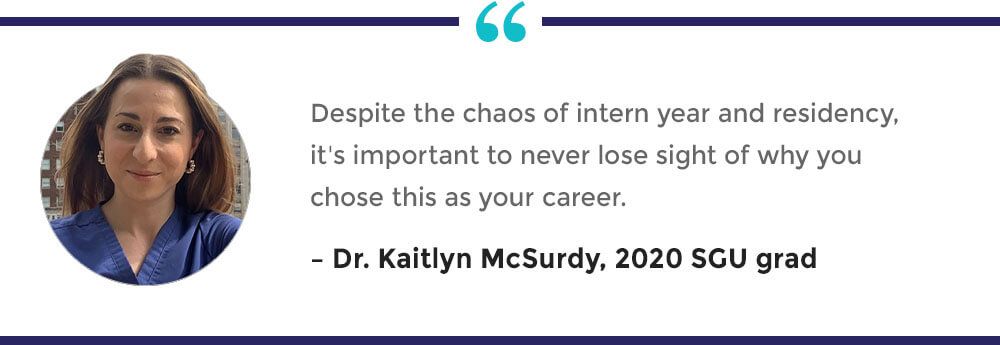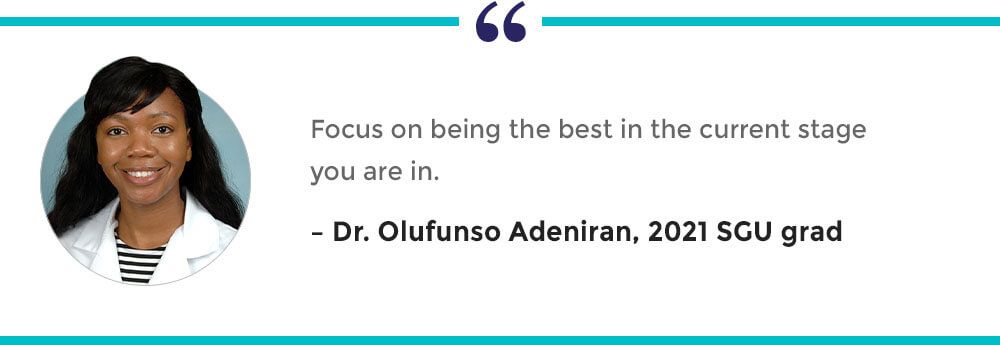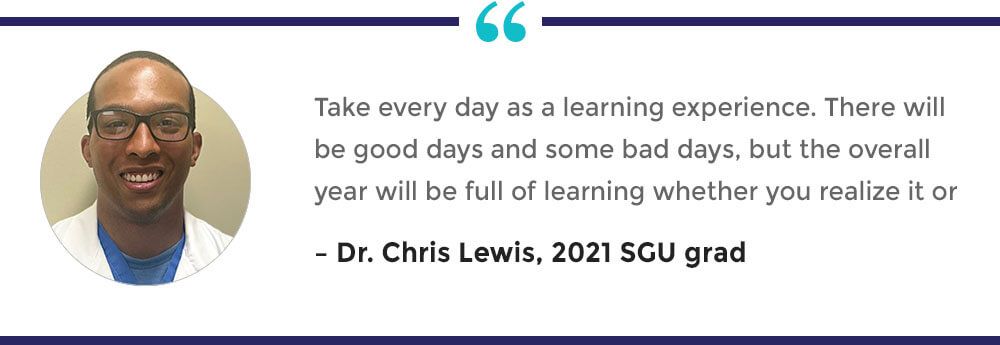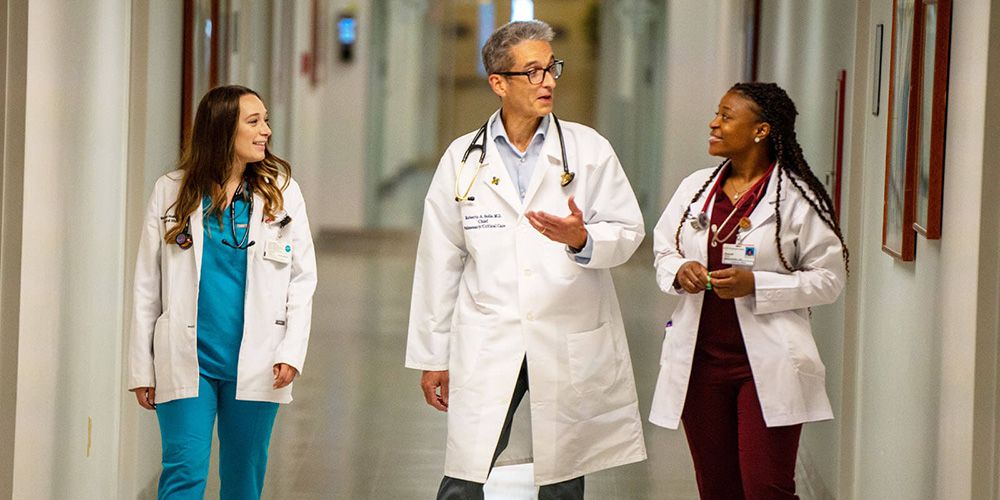The road to becoming a physician is filled with different phases of training—from the early years of medical school spent learning the foundations of medicine to the hands-on experience you’ll receive during clinical rotations and eventually as a resident physician.
You’ve likely heard that residency will be one of the most critical periods of your physician training. This period is when you’ll take everything you learned in medical school and put it to use in treating actual patients (under the supervision of an attending physician).
This can feel like a tremendous amount of responsibility for graduating medical students—especially if you have a number of lingering questions about medical residency programs in general. That’s why we gathered some first-year resident advice from physicians who have walked this path before you. Read on for some tips to help you get through your intern year.
Intern vs. resident: What to expect in your first year
Your initial year of residency will be your intern year. By this point in your journey to becoming a physician, you’ll have garnered plenty of foundational training and even some hands-on experience with patients. But for resident doctors, the intern year is about learning the multitude of communication and administrative skills you’ll need to thrive as a practicing physician.
Interns learn the ins and outs of coordinating a patient’s care. This includes:
- Consulting with patients and their families
- Working with a team of residents, consulting physicians, nurses, technicians, etc.
- Writing orders
- Working with electronic health records (EHRs).
It’s also helpful to note that a medical resident may rotate in a medical specialty during their intern year that differs from where they’ll ultimately practice.
Those interested in psychiatry, for example, are often advised to complete an intern year (preliminary IM) focusing on internal medicine. Likewise, a future ophthalmologist would be wise to spend their intern year in surgical practice in a preliminary surgery year. It’s also common for interns to rotate through different medical specialty areas as they work to round out their knowledge of adequate patient care and proper medical procedure, known as a transitional year.
It can be simplest to think of it this way: Your intern year isn’t just about perfecting your aptitude for your eventual specialization—it’s where you’ll gather the basics of medicine and surgery that you’ll need to build an effective foundation for the remainder of your career.
3 critical pieces of advice for your first year of residency
The transition from student to medical resident can be overwhelming. There are plenty of new factors to grow accustomed to, from the responsibility of caring for actual patients to the dramatic increase in administrative duties you were never tasked with in med school.
As you approach your first year in a medical residency program, keep the following tips in mind from St. George’s University (SGU) School of Medicine graduates who were once in your shoes.
1. Take your responsibility as a physician seriously
While your time in medical school equipped you with much of the knowledge you’ll need to practice and your clinical rotations provided you with some hands-on experience to get you comfortable, treating actual patients can be a whole different ball game.
“It’s okay to be a bit nervous or intimidated by the responsibility of it all,” notes Dr. Chris Lewis, 2021 SGU graduate. “All it means is that you care for the patients and understand the responsibility you have to do right by them.”
During residency, the patients you’re working with aren’t people acting in a simulation lab—they’re actual patients experiencing real issues, and you’ll be tasked with treating them. While this can introduce an added layer of anxiety, remaining focused on the patient can also be the very thing that pushes you forward.
“Despite the chaos of intern year and residency, it’s important to never lose sight of why you chose this as your career,” offers Kaitlyn McSurdy, MD and 2020 SGU grad.

2. Be patient with yourself
By the time you become a first-year medical resident, you’ll be surrounded by others who are highly skilled and qualified to practice medicine. Often, doctors fresh out of medical school are eager to jump in and prove themselves as quickly as possible. And while there’s no harm in this, it’s also important to not get ahead of yourself.
First-year medical residents are expected to learn a massive amount in a short period of time, so it’s critical to give yourself the time you need to master the process without comparing yourself to the other medical professionals around you. “Focus on being the best in the current stage you are in,” emphasizes Olufunso Adeniran, MD and 2021 SGU graduate. You’ll learn much from the residents with a year or two of residency completed as well as the experienced nurses and other professionals you’ll interact with.
She goes on to explain that residency is a fast-paced environment with learners at all different stages. It’s easy to assess your performance based on that of more senior residents, but she advises against making comparisons like this.
“A huge part of being an intern involves not knowing everything—not knowing most things, actually,” Dr. Adeniran explains. This is how you’ll grow as a physician.
Your first year of residency will be filled with exponential growth, and not every aspect of it will come easily to you. “You’re going to make mistakes. But the only way to progress is to move forward and learn from them,” offers 2020 SGU grad Dr. Christopher Reilly. “Failure is necessary to become a better doctor.”

3. Use the expertise of your colleagues
With that in mind, Dr. Reilly emphasizes the necessity of reaching out for help when you’re struggling during residency. “Remember that you have your senior residents and attendings there for you when things aren’t going the way you planned,” he says.
While your instincts may tell you that reaching out for additional guidance is a sign of weakness, it can actually be the exact opposite. “Your seniors and attendings will trust you more if they know you’re not afraid to ask for help and seek frequent feedback on how you can improve,” Dr. McSurdy explains.
When treating actual patients, there is often little room for error. One sign of a high-quality physician is their willingness to admit when they’re in over their head. “Be honest with yourself about what you know and don’t know, and never hesitate to ask your senior, attending, or nursing colleagues for help,” notes Dr. Shelby Parker, 2021 SGU graduate. “Everyone starts as a beginner, and your job during residency is to learn how to become a great doctor—no one expects you to know it all from day one.”

Enter your first year of residency with confidence
Every single day of your medical residency will come with new learning experiences. The best physicians are the ones who learn to prioritize their patients, practice with humility, collaborate with colleagues, and remain committed to the learning process.
“Take every day as a learning experience,” advises Chris Lewis, MD and 2021 SGU grad. “There will be good days and some bad days, but the overall year will be full of learning whether you realize it or not.”
One surefire way to prepare yourself for your first year of residency is to partner with a medical school wholly committed to your success as a resident doctor. Learn how St. George’s University excels in this area in our article “SGU Residency Placements: 6 Facts That Might Surprise You.”


